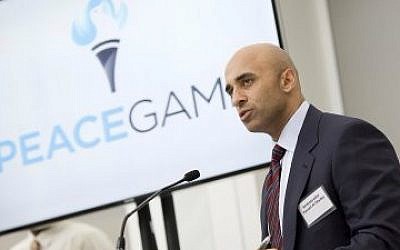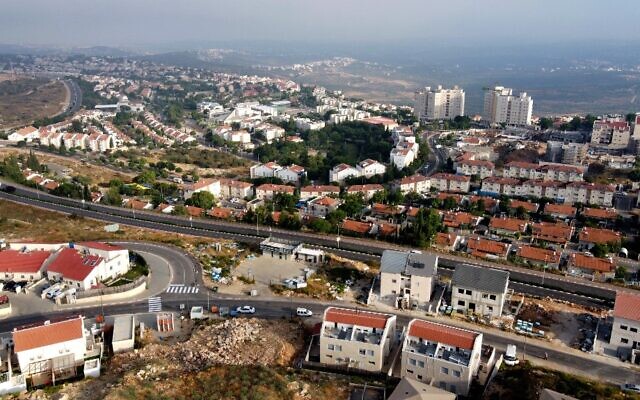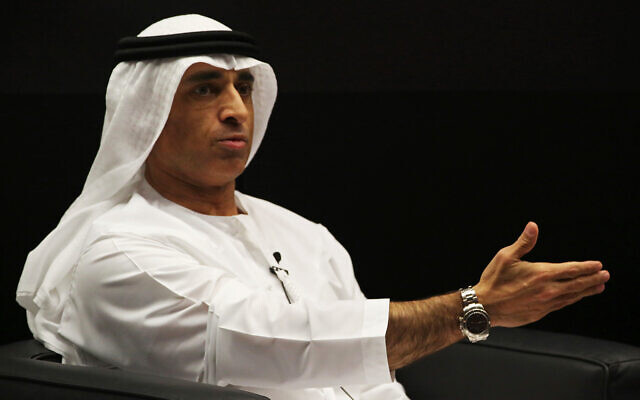In new op-ed for Israeli paper, ambassador to US says agreement will provide Abu Dhabi with ‘stronger’ tools to ‘forcefully’ promote rights of the Palestinian people
By TOI STAFF
Emirati Ambassador to the US Yousef al-Otaiba at an event with then-US House Speaker Paul Ryan, at the Emirates Diplomatic Academy, in Abu Dhabi, United Arab Emirates, Jan. 25, 2018. (AP Photo/Jon Gambrell)
In his second op-ed for an Israeli newspaper, the United Arab Emirates’s ambassador to the US said the new normalization agreement with Israel would allow for “direct” advocacy for the Palestinian cause, including the establishment of a sovereign state, now with “stronger” tools.
“As we have for fifty years, we will forcefully advocate for these ends,” Yousef Al-Otaiba wrote in the piece for Yedioth Ahronoth. “Now, we will do it directly, face to face and empowered with stronger incentives, policy options and diplomatic tools.
“The UAE will remain an ardent and consistent supporter of the Palestinian people — for their dignity, their rights and their own sovereign state. They must share in the benefits of normalization,” he wrote.
“We also closed the gate on annexation and created new dynamics in the peace process,” Al-Otaiba said.

UAE ambassador in Washington Yousef al-Otaiba, September 18, 2014. (UAE embassy website)
In his first op-ed in June, months before the normalization deal was clinched, Al-Otaiba warned Jerusalem against its plan to unilaterally annex parts of the West Bank, saying such a move would destroy any hopes for further rapprochement between the Jewish state and the Arab world.
Al-Otaiba was one of the three Arab ambassadors to attend the White House ceremony during which US President Donald Trump unveiled his peace plan for the Middle East.
Israel and the UAE announced an agreement last week to establish full normalized relations. The agreement makes the UAE the third Arab country, after Egypt and Jordan, to have full, active diplomatic ties with Israel.
Prime Minister Benjamin Netanyahu has denied reports the deal included a green light for the US to sell Abu Dhabi its most advanced fighter jets and UAVs.
As part of the deal, which solidifies an existing secret relationship forged over joint opposition to Iran, Israel has agreed to suspend its plans to annex some 30 percent of the West Bank. Netanyahu has insisted he still plans to move forward with those plans later on, though settler leaders doubt this assertion.

A view of the Israeli settlement of Ariel in the West Bank, on July 1, 2020. (Jack Guez/AFP)
Meanwhile, according to the Ir Amim nonprofit, major infrastructure projects in the E-1 corridor close to Jerusalem are still being advanced, which could hinder the creation of a Palestinian state.
Palestinian Authority President Mahmoud Abbas condemned the normalization agreement at a joint meeting of the Palestinian leadership on Tuesday night, and urged other countries to stick to a 2002 Saudi-led proposal that conditions ties with Israel on the creation of a Palestinian state.
While UAE officials have consistently described their agreement as a step toward helping Palestinian statehood by halting annexation plans, Abbas criticized those for whom “the Palestinian question begins and ends with annexation.”
Raphael Ahren and Aaron Boxerman contributed to this report.




That’s a shame.